Updated on November 1, 2024.
Figuring out what triggered a psoriasis flare is sometimes easy and sometimes easier said than done. Psoriasis is an autoimmune disease, or a condition where the immune system attacks healthy cells. Plaque psoriasis can be triggered by a number of things, including injuries to the skin, certain medications, illnesses, infections, and stress. Treatment for a flare will depend on the severity of a flare, and you should discuss with your healthcare provider how to address a flare and what to do if symptoms are severe.
Here are some ideas to get relief the next time you experience a flare:
Take your medication (as directed)
Sticking with a plaque psoriasis treatment can be tough; ongoing treatments can be expensive; and busy schedules mean you might not always have time to apply a topical treatment. When psoriasis is under control, you might forget that you even need treatment in the first place. Plus, the pressure of following a treatment plan can be a source of emotional stress.
Unfortunately, not following your treatment plan can result in flares or poorly controlled symptoms. Taking a treatment inconsistently can also make it difficult to tell whether that treatment is effective.
If you haven’t been using your treatment as directed, get back onto your schedule as soon as possible.
If you have questions about your medication, speak with your healthcare provider or pharmacist. If a particular treatment isn’t working for you, if you start having more flares, or you’re experiencing side effects, talk to your healthcare provider about different treatment options.
Moisturize
Moisturizing properly is one of the most important things you can do to treat psoriasis and ease your symptoms. Moisturizing will help keep dry skin from getting drier, reduce redness and other discoloring, and help the skin heal. Moisturizing will also help relieve one of the most common and aggravating symptoms of a psoriasis flare—the itching.
What type of moisturizer is the best? Fragrance-free and alcohol-free heavy creams and ointments that lock in moisture. There are also a variety of natural options for moisturizers, including aloe vera and olive oil. Always apply your cream or ointment to your skin after a bath or shower. It’ll help seal in the moisture and keep your skin extra hydrated.
Take an oatmeal bath
No, not the oatmeal from your pantry. A short soak in a colloidal oatmeal bath (typically referred to as an “oatmeal bath”) may help reduce the itching of a flare, and may also help loosen scales and relieve dry skin. Studies have shown that colloidal oatmeal has anti-inflammatory and antihistamine effects. Make sure to choose 100 percent natural colloidal oatmeal, which can be found at your local pharmacy.
Be sure to bathe in lukewarm water, since water that’s too hot can cause dry skin and exacerbate symptoms. Use a mild soap with added oils or fats, and avoid antibacterial soaps, which can irritate the skin. Limit your time in the water to 15 minutes, and always apply moisturizer immediately after getting out of a bath or shower.
Decrease your stress level
Psoriasis flares can be stressful, and stress can trigger and exacerbate symptoms.
The good news is, there are a lot of ways to de-stress—and some of them can be fun, too. Going outside, looking at cute animal pictures online, chatting with a good friend, and laughing are all quick ways to relieve stress. For a longer-term plan, try incorporating stress-busting activities like meditation, yoga, and exercise into your daily or weekly schedule.







